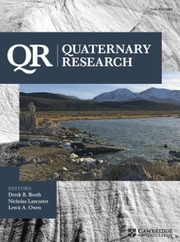Crossref Citations
This article has been cited by the following publications. This list is generated based on data provided by
Crossref.
Broecker, Wallace S
and
Denton, George H
1989.
The role of ocean-atmosphere reorganizations in glacial cycles.
Geochimica et Cosmochimica Acta,
Vol. 53,
Issue. 10,
p.
2465.
Wright, H. E.
1989.
The Geology of North America—An Overview.
p.
513.
Wright, H.E.
1989.
The amphi-atlantic distribution of the younger dryas paleoclimatic oscillation.
Quaternary Science Reviews,
Vol. 8,
Issue. 4,
p.
295.
Broecker, Wallace S.
and
Denton, George H.
1990.
The role of ocean-atmosphere reorganizations in glacial cycles.
Quaternary Science Reviews,
Vol. 9,
Issue. 4,
p.
305.
Broecker, Wallace
Bond, Gerard
Klas, Mieczyslawa
Clark, Elizabeth
and
McManus, Jerry
1992.
Origin of the northern Atlantic's Heinrich events.
Climate Dynamics,
Vol. 6,
Issue. 3-4,
p.
265.
Group, Mallorca
1992.
Start of a Glacial.
p.
1.
Jansen, Eystein
1992.
Following iceberg footprints.
Nature,
Vol. 360,
Issue. 6401,
p.
212.
Huon, Sylvain
and
Ruch, Patrick
1992.
Mineralogical, KAr and 87Sr/86Sr isotope studies of Holocene and Late Glacial sediments in a deep-sea core from the northeast Atlantic Ocean.
Marine Geology,
Vol. 107,
Issue. 4,
p.
275.
Bond, Gerard
Heinrich, Hartmut
Broecker, Wallace
Labeyrie, Laurent
McManus, Jerry
Andrews, John
Huon, Sylvain
Jantschik, Ruediger
Clasen, Silke
Simet, Christine
Tedesco, Kathy
Klas, Mieczyslawa
Bonani, Georges
and
Ivy, Susan
1992.
Evidence for massive discharges of icebergs into the North Atlantic ocean during the last glacial period.
Nature,
Vol. 360,
Issue. 6401,
p.
245.
Rampino, Michael R.
and
Self, Stephen
1992.
Volcanic winter and accelerated glaciation following the Toba super-eruption.
Nature,
Vol. 359,
Issue. 6390,
p.
50.
Rampino, Michael R.
and
Self, Stephen
1993.
Climate-Volcanism Feedback and the Toba Eruption of ∼74,000 Years Ago.
Quaternary Research,
Vol. 40,
Issue. 3,
p.
269.
Baumann, K.-H
Lackschewitz, K.S
Erlenkeuser, H
Henrich, R
and
Jünger, B
1993.
Late Quaternary calcium carbonate sedimentation and terrigenous input along the east Greenland continental margin.
Marine Geology,
Vol. 114,
Issue. 1-2,
p.
13.
Zhao, Meixun
Rosell, Antoni
and
Eglinton, Geoffrey
1993.
Comparison of two U37K-sea surface temperature records for the last climatic cycle at ODP Site 658 from the sub-tropical Northeast Atlantic.
Palaeogeography, Palaeoclimatology, Palaeoecology,
Vol. 103,
Issue. 1-2,
p.
57.
Lehman, Scott J.
1993.
Ice sheets, wayward winds and sea change.
Nature,
Vol. 365,
Issue. 6442,
p.
108.
MacAyeal, D. R.
1993.
Binge/purge oscillations of the Laurentide Ice Sheet as a cause of the North Atlantic's Heinrich events.
Paleoceanography,
Vol. 8,
Issue. 6,
p.
775.
Broecker, Wally
Bond, Gerard
and
McManus, Jerry
1993.
Ice in the Climate System.
p.
161.
Weeks, Robin
Laj, Carlo
Endignoux, Lionel
Fuller, Michael
Roberts, Andrew
Manganne, René
Blanchard, Erick
and
Goree, William
1993.
Improvements in long-core measurement techniques: applications in palaeomagnetism and palaeoceanography.
Geophysical Journal International,
Vol. 114,
Issue. 3,
p.
651.
Grimm, Eric C.
Jacobson, George L.
Watts, William A.
Hansen, Barbara C. S.
and
Maasch, Kirk A.
1993.
A 50,000-Year Record of Climate Oscillations from Florida and Its Temporal Correlation with the Heinrich Events.
Science,
Vol. 261,
Issue. 5118,
p.
198.
Balsam, William L.
and
Williams, Douglas
1993.
Transport of carbonate sediment in the western North Atlantic: Evidence from oxygen and carbon isotopes.
Marine Geology,
Vol. 112,
Issue. 1-4,
p.
23.
Andrews, J. T.
Tedesco, K.
and
Jennings, A. E.
1993.
Ice in the Climate System.
p.
167.


